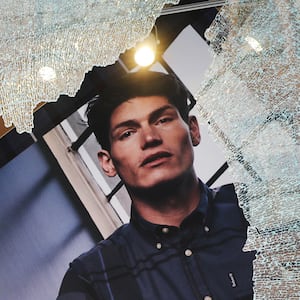Since the murder of George Floyd and subsequent worldwide protests, companies from Amazon to Fox News have been quick to offer statements supporting social justice and the Black Lives Matter movement. (Such Instagrammable solidarity is, of course, often hypocritical to the point of insult.)
The template for such posts is simple and has been the subject of parody: white text over a black background plus “We see you” equals acceptable enough for many social media teams. But not every brand is sticking to the sentiment. Take the case of Mota Skates, a roller skate manufacturer known in the derby scene for its affordable(ish) offerings.
As protests raged on last weekend, the Michigan-based company posted a Venn diagram graphic stating “It’s OK to be all three,” showing overlaps between feeling “outraged by George Floyd’s death,” “not condone looting or rioting,” and “support[ing] good police officers.”
“Black Lives Matter,” the caption read. “It’s sickening that would ever be in question. Division and fighting makes it worse. We stand for justice and peace—United we stand, divided we fall.”
Skaters swiftly commented on the post, with its whiff of “All Lives Matter” messaging. “Never been more proud to not own anything of yours,” one person wrote. “I hope your business fails after this ignorant bullshit.”
Mota, which did not respond to numerous inquiries by The Daily Beast by phone and email, later apologized in the caption of another Instagram post.
Underneath a black square, the copy read: “Mota Skates [founders] Doug and Julie Glass sincerely apologize for our ignorance regarding the black lives movement. We are working with others in the community to better ourselves in support of BLM. Your voices are heard. We are open to positive criticism that will continue to improve the movement. We will continue to reach out as we navigate this very sensitive matter. We understand this is not enough and we will continue our support to the best of our knowledge and provide more information regarding our actions in the upcoming days.”
This was also dragged, with many taking issue with the vague phrase “positive criticism” and accusing the brand of yet again missing the mark.
It is not the first time Mota Skates bungled standing against racism. In 2018, the brand made custom skates blazed with the “Blue Lives Matter” flag.
Mota Skates also sold a type of boot called “Savage,” using a pejorative term associated with the continued abuse of indigenous peoples.
Skaters have been quick to disavow Mota. As of Thursday, a GoFundMe account raised over $4,000 to “assist skaters of color who need financial assistance in replacing their [Mota] skates.”
“No one should have to wear your brand when you so clearly do not care about the lives that you are profiting from,” the page reads.
Others have taken to Reddit to describe their solutions: covering up the Mota logo on their skates, making boot covers to shield it, and ripping it off altogether using Acetone or other solvents.
A collective of skate shops across the globe—Wicked Skatewear (with locations in Huntington Beach and Los Angeles), Five Stride (based in Brooklyn and Portland), lowlife (Montreal), and Double Threat (London)—came together to announce they will no longer sell Mota Skate products.
“This Shop is UnMotavated,” the group’s statement reads, adding that unsold products in the store will be stripped of labels and donated to Derby Without Borders, a non profit that provides equipment to leagues without access.
Store owners involved with the initiative told The Daily Beast that this move is a first step for the skate community to reconcile its inclusive reputation with a more racist reality.
Roller skating has played an important role in the Civil Rights movement—a man named Ledger Smith symbolically skated 685 miles from Chicago to DC to attend the March on Washington, and rinks were the scenes of countless protests against segregation. The 2019 film United Skates documents a vibrant scene of black roller skaters fighting to save their community.
But roller derby specifically, maybe best known to outsiders due to the 2009 Ellen Page film Whip It, has been seen as slow to integrate and cliquish.
“The general purpose of the skate community, and this is what I tell my customers, is that we’re pro-queer, pro-black, pro-anything that makes you feel outside of the norm,” Kat Espinoza, a co-owner of Wicked Skatewear, said. “Roller Derby is one of those things where if you feel weird your whole life, you get to it and say, ‘Oh, this is my place. This is where I belong.’ I can tell you that’s why 90 percent of people join.”
Espinoza added that the skate world has always been “punk,” but it has only just begun to become “political.”
“Now that we’ve become more vocal, that has created a divide, call-outs and a lot of back and forth,” Espinoza said. “We’re here to talk about the uncomfortable stuff, but some people obviously aren’t as comfortable with that conversation.”
Espinoza added that in recent years, black and indigenous skaters “noticed how white roller derby was.”
“There was little representation,” she said. “People have become more comfortable speaking up to leagues for better representation. Ever since that started, there has been somewhat of a cultural shift. But some people still think of it as a utopia where nothing needs to be changed.”
Espinoza and her team are currently in the process of removing the Mota label from skates before they ship out stock to Derby Without Borders. Her preferred method of un-branding is polymer remover. “It’s a little cathartic for us to take them off,” she admitted.
“We’re going to lose profits we would have made from these skates, but we’re willing to part with that,” Espinoza added. “Black people paved the way for us to skate the way we skate. All those crazy leg [movements], backwards skating, that comes from [black skate culture]. All people need to do is be informed.”
Nicole Williams, also known by her roller derby moniker Bonnie Thunders, co-owns Five Stride Skate Shop. “The Mota movement right now is really important, but I definitely don’t want it to overshadow the fact that roller derby as a sport is not anti-racist,” she said. “We have a lot of work to do.”
Williams described roller derby as “coming from a feminist movement which has its own issues with intersectionality and just acknowledging BIPOC and others.”
Since Mota Skates are, in Williams words, “a bit cheaper” than the other options for derby, a notoriously expensive hobby, many newer skaters have relied on the brand for their first pair.
“The skates do have a good fit for certain people’s feet,” Williams said. “When it comes to competitive derby, you want to make sure your foot stays put, so that’s really important. So it is a little disappointing because for the people who buy Mota, it fits them so well. We have to figure out what fits those skates in the future.”
The Mota controversy comes at a time when morale in the roller derby community is already low. The coronavirus pandemic caused the competitive season to be cancelled. With their income so abruptly cut, leagues are struggling financially.
“We’re feeling really bad about that,” Williams said. “So I think there is a sense of skaters who don’t really understand why this Mota ban is so critical. They’re not really in an anti-racist headspace, or they’re afraid to talk about it. And that’s how a lot of white people feel right now.”
Still, Williams said she is looking forward to getting rid of the skates. “It will be a really enjoyable moment to be able to erase the name and just kind of be done with it and know that we don’t have to deal with these people anymore,” she said.
Meghan “Mae Dae” Schuttler is the director of Derby Without Borders, which she founded in 2017. “Roller skating as a whole, the origins are in black and POC culture,” she said. “But in the sport of roller derby, representation is lacking. A lot of that stems from derby being this feminist sport that was born when white feminism was still very prominent. It feels very radical and revolutionary if you are a white woman. I think there’s not a lot of work people have done in leagues to create spaces that really critically think about inclusion in terms of racial identity as well as queer identity.”
Schuttler says she will tell anyone who receives the donated Mota Skates the brand’s backstory in an effort to be transparent. “We do primarily work with people of color, people in other regions outside of the US and Europe,” she said. “In our organization, we want to decolonize our work as much as possible. To that end, we’ll let them know that these skates came out of this situation. And if they don’t feel comfortable skating on Mota, there are other available brands.”
Lindsey Parker, 28, lives in Baltimore and skates at Charm City Roller Derby. She went to her first queer skate night about a year ago, and fell in love with it immediately. “It’s the best thing I’ve ever been to,” Parker said. “I’ve never been a person who understood what felt like a release about dancing. I understood it once I was on skates. It feels so expressive to get up and go super fast on some wheels.”
Parker, who is black, added that, ”I would definitely say the inclusivity of it all is one of the major draws. My league really prides itself on being gender-diverse, body-diverse, racially diverse. It’s upsetting that a prominent skate company would not align with those stated values.”
Parker was considering “upgrading” to Mota Skates before the Instagram post, but she has since changed her mind. “Their radio silence for the week leading up to their statement kind of lets you know where the brand stands,” she said. “Then they came out with a tone-deaf post that was somewhat appalling, for sure.”
Parker grew up in Memphis. “My only roller skating rink in retrospect was pretty white,” she recalled. “There were notable differences in the music they played on designated ‘adult nights.’ They would play hip-hop, because I guess you have to keep that away from the kids.”
After she moved to Baltimore, Parker learned about the city’s black skating community. “The camaraderie there is so amazing,” she said. “It’s really sad to see that excluded from so many other rinks, even today.”






